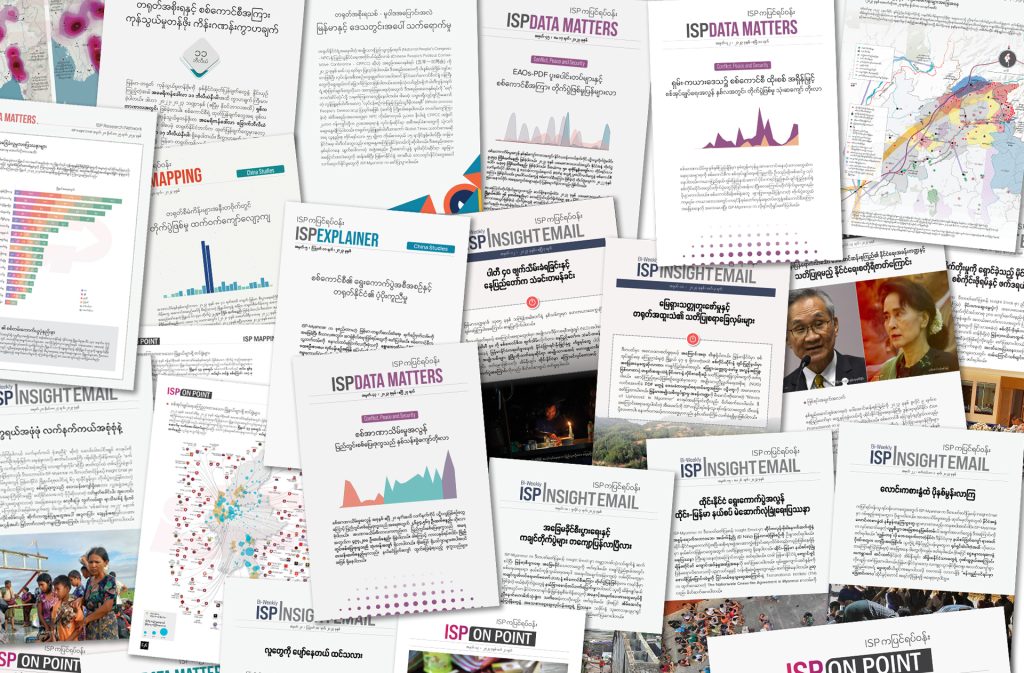Insight Email No. 30
This Insight Email is published on January 9, 2024, as a translation of the original Burmese language version that ISP-Myanmar sent out to the ISP Gabyin members on December 31, 2023.
Editor’s Foreword
A year has ended, and a new year has begun.
Like the milestones a human has passed, it is time to look back at milestones Myanmar has passed during this time. We can reflect with deep empathy upon the lives of the people through the wrath of ferocious fighting as a consequence of the military coup in Myanmar: many have died, many have been displaced, and many have suffered from unspeakable grief and losses. Militarization has expanded in Myanmar, and we have yet to see a light at the end of the tunnel. The future is still a bleak picture.
In the transition to the new year of 2024, ISP-Myanmar will present this Insight Email as a ‘year-end special report’ rather than its regular format. We will briefly look back at what happened in Myanmar in the domains of (1) politics, (2) the economy, (3) China–Myanmar relations, (4) the socio-economic situation, and (5) the climate crisis. The brief discussion may not cover all events comprehensively, but many topics will be excerpted from what ISP-Myanmar, as a Burmese-born think tank organization, discussed during 2023 under three themes, namely (1) conflict, peace, and security, (2) China studies, and (3) political economy aspects. In addition, this bulletin would like to explain what ISP-Myanmar had published in 2023, and were popular and interesting topics that ISP-Myanmar raised in the last year.
In 2024, ISP-Myanmar would like to convey its best wishes to the global com-munity, including people in Myanmar: that they may thrive with compassion, peace, and positive hopes, and that they may lead safe and secure lives, free from suffering and grief.
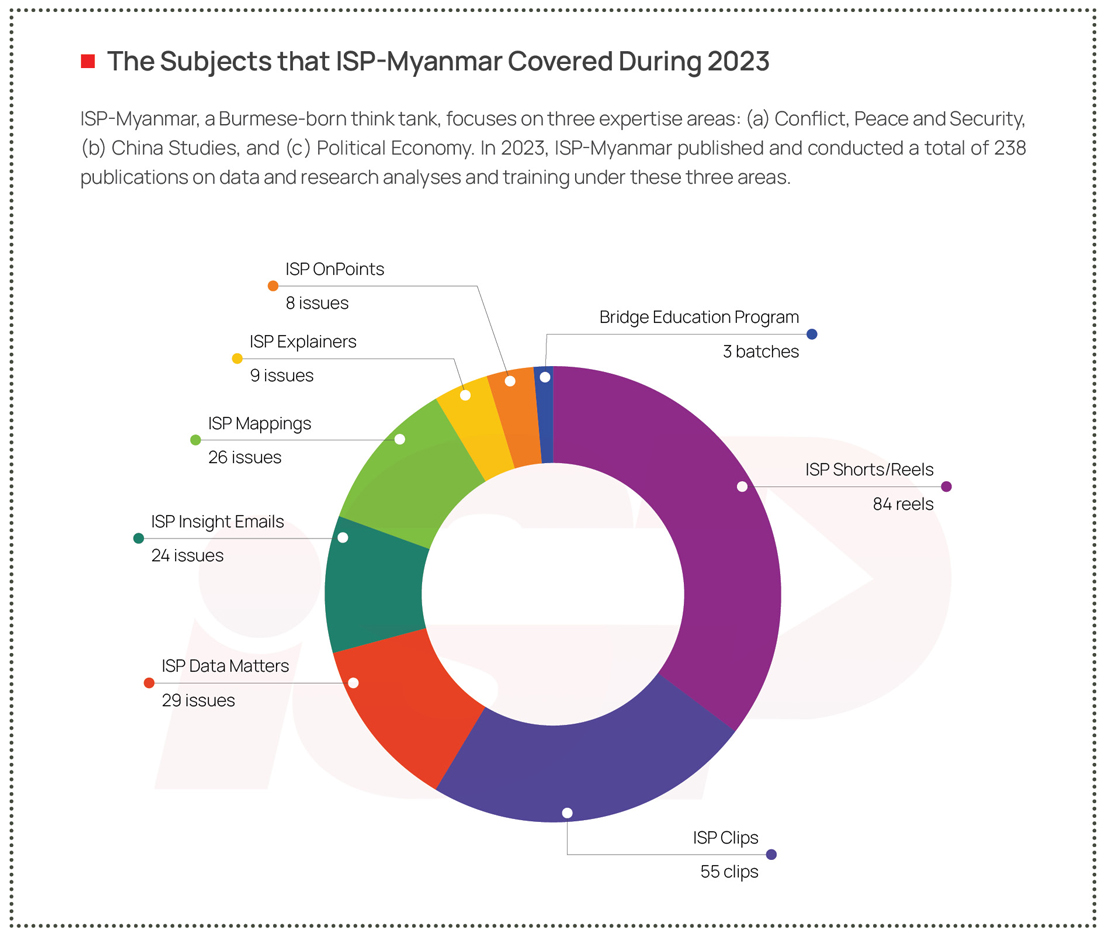
Of the 238 research analysis, data visualizations, videos and training program that ISP-Myanmar produced and conducted in 2023, we will present a summary under five main categories:
1.Diminishing Role of Politics
2.Give War a Chance
3.China’s Distinct Move
4.Social Devastation
5.Climate Impacts.

1.Diminishing Role of Politics
After almost three years since the military coup, the ruling State Administrative Council (SAC) has been struggling with a lack of popular support and a crisis of political legitimacy. ISP-Myanmar has predicted this possible trend since October 2021. In 2023, the SAC extended its terms two times and entered into a quagmire by imposing martial law on more townships (see ISP OnPoint No. 12).
On the occasion of the two-year anniversary of the military coup, on February 2, 2023, a special publication of ISP Insight Email, “The Bricks Have Fallen,” focused on seven setbacks of the military coup, including “escalating militarization.” The military coup dashed the policy of resolving political crises on the table, which was practiced from 2010 to 2020 by two successive governments. Moreover, violent crackdowns by the SAC have left many areas with no option but the armed revolution. As a consequence, ISP-Myanmar’s data analysis noted that at least 577 armed resistance groups have emerged across the country.
At the end of 2023, it is obvious that the prospect of restoring the pre-coup old normal in Myanmar is no longer feasible. In addition, Operation 1027 has further entangled Myanmar’s conflict landscape with geopolitics, pushing the extant configuration of political power and territorial integrity of Myanmar polity beyond a mere status quo and into an irreversible trajectory (see ISP OnPoint No.19).
The SAC finds itself in the trap of an uncertain promise of a general election. Militarily (as ISP OnPoint No. 19 discussed), the SAC finds itself overstretched across multiple fronts, rendering it fragile and vulnerable. At the current time, it is very difficult to imagine how it could proceed, when in February 2024 it must find a way to extend its rule by one more term. On the other hand, the SAC has promised an election, but cannot confirm the time frame. The election requires confirmed voter lists, and the SAC said the coming national census will be conducted in October 2024, before preparing voter lists. Then the possible date for the election could be in 2025, analysts speculate. The SAC’s chairman has claimed the coming election will be held across the whole country, without exceptions for any regions. But in a situation where 55 townships are under martial law, the evidence suggests that this is hardly possible.
Instead of promoting politics and de-escalating militarization, now there is weakening politics and escalating militarization in the country, and the role of political parties as crucial stakeholders are diminishing. The SAC abolished all political parties, including the National League for Democracy (NLD), and ordered them to re-register with the election commission. The new Political Party Law was adopted with more restrictions, to register as a national-level party, it must recruit a minimum 100,000 members and deposit 100 million kyats (approx. 28,500 USD) in the bank as an assurance. The SAC thus has raised the bar for political parties. Moreover, at this time of political turmoil in the country, the party law requires the party to open offices in at least 165 townships (half of the total townships in the country).
Parties with great political legacy, including the NLD and the Shan National League for Democracy (SNLD), decided to stay out of the game and didn’t re-register. The new political party registration law, enacted in late January 2023, is a draconian law that imposes serious barriers for political parties to resist the regime’s patronage and manipulation. The motivation of the military is more clearly seen as an attempt to maintain dominance over other actors, treating other political players as its subordinates or proxies. The SNLD’s decision can be construed as a valiant refutation of the military council’s legitimacy (see ISP OnPoint No. 13). The SAC’s promise of holding elections is impractical to manage with the existing security situation, and it is hardly believable that any election they hold will fulfill the minimum standards of being free and fair.
The SAC declared the year 2022 as a “year of peace” but failed. The SAC’s political programs in 2023 have been further unsuccessful. The SAC’s peace process was in vain and the gathering of the eighth anniversary of the Nationwide Ceasefire Agreement (NCA) on October 15, 2023, didn’t make a difference. The SAC claimed that it would organize the meeting in a different essence and invite broader participants. But not all the important stakeholders showed up at the meeting, and politically, it didn’t make an important breakthrough. Then, through the SAC chairman’s speech, it can be seen that the NCA is becoming a dead-end. The SAC’s negotiating team met with delegates from Three Brotherhood Alliance (3BHA) in June 2023 at Mongla, but the flare-up of fighting following the launch of Operation 1027 in October meant Mongla talks failed (see ISP Insight Email No. 16).
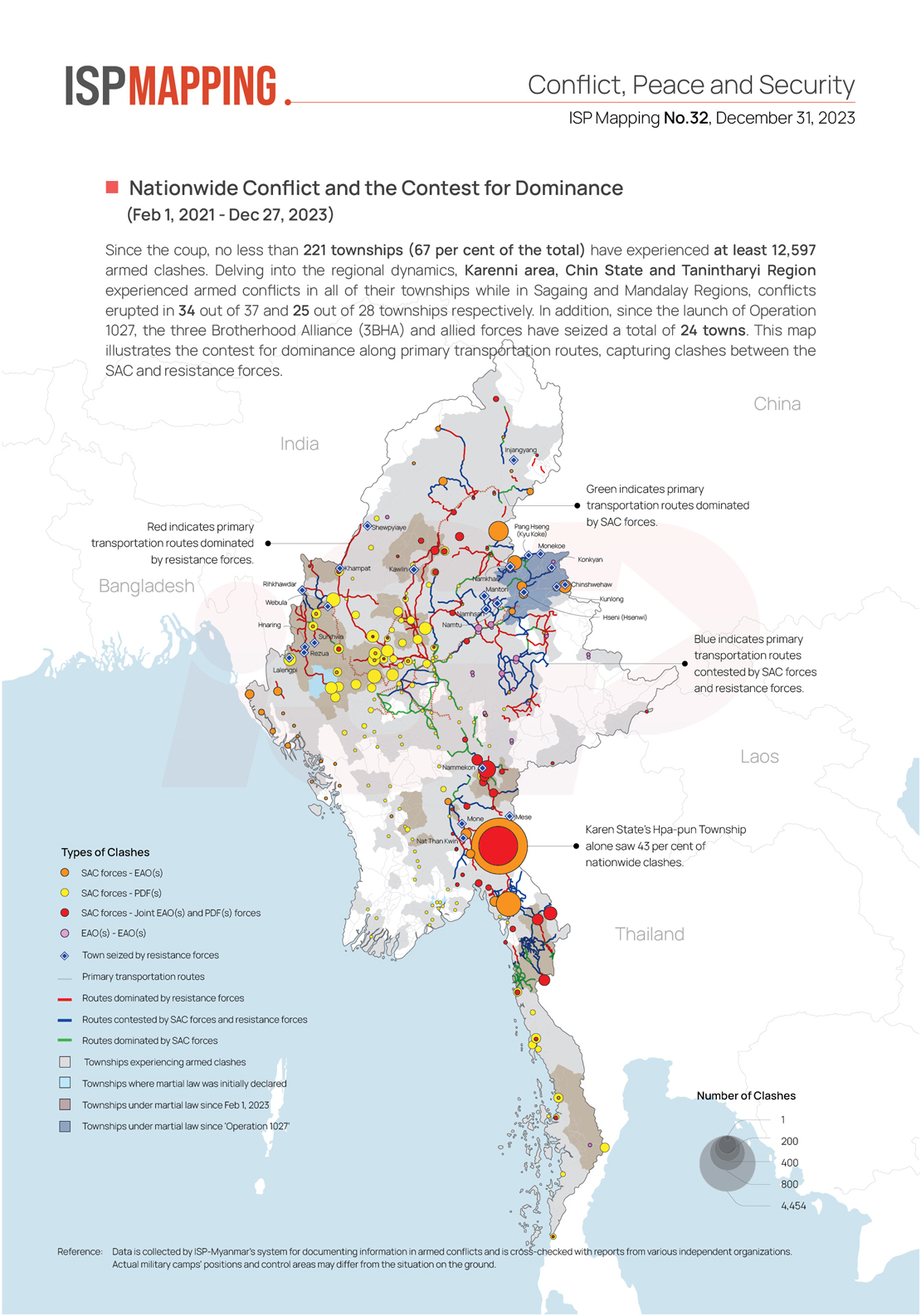
The internal cohesion among the SAC leaders is not well-ordered. During the three years of the coup, the SAC was reorganized four times. In 2023 alone, there were three major reshuffles among the SAC leaders. Many civilian leaders were sacked from the SAC, except Mahn Nyein Maung, a Karen national. In the military leadership, those presumed to be the SAC chairman’s right-hand men, Lt. Gen. Moe Myint Tun and Lt. Gen. Soe Htut, were sacked (see ISP Insight Email No. 24). Lt. Gen. Moe Myint Tun, one of the senior SAC leaders, and his deputy, Brig. Gen. Yan Naung Soe were charged with many offenses, including high treason and corruption, and sentenced to life imprisonment. Former Home Affairs Minister Lt. Gen. Soe Htut was charged with corruption. Around 400 businessmen were summoned and interrogated in Naypyitaw relating to their relationship with those arrested generals. During the three years, there were many reshuffles in the regime and its government body.
On the other hand, the detained opposition leader, Aung San Suu Kyi, is still enjoying popular support, but the SAC still continues to reject her important role. There are frequent press releases stating that the junta officials regularly meet with Aung San Suu Kyi, but no political progress has developed from this. On July 12, 2023, the regime allowed former Thai foreign minister Don Pramudwinai to meet with Aung San Suu Kyi for more than an hour. It was the first meeting for Aung San Suu Kyi with a foreign diplomat after two years of the coup. After the meeting, Mr. Don further emphasized the need to separate the two types of conflicts to effectively address the political problem. He typified the first as a political conflict of civil–military relations, and the second as armed conflicts that have been raging since the country’s independence. He said that the current conflicts primarily involve military and civilian leaders and should be resolved urgently, with other factors being considered secondary. This is what his political narrative might explain for some ASEAN countries. ISP-Myanmar recognizes the Myanmar problem as a “nation-building failure” and it is of the utmost importance to complement Don’s civil–military relations conflict resolution approach with efforts to tackle the root causes of political conflict in Myanmar, so that the nation can find a way to escape the vicious cycle of political turmoil (see ISP OnPoint No. 16).

2.Give War a Chance
In 2023, the words “give war a chance” seems more applicable to Myanmar than any slogan for peace. Many people glorify the war and see the “hell flower of war” as a valuable golden flower. Since the opposition National Unity Government (NUG) declared a “total resistance war” against the junta on September 7, 2021, all forms of fighting by various armed groups have flared up in the country. Myanmar’s conflict landscape has extended into the areas where there formerly was no fighting. Again, the Three Brotherhood Alliance (3BHA) and its allies launched Operation 1027 on October 27, 2023, and ISP-Myanmar saw the resistance of Myanmar reach the second turning point. From a military perspective, Operation 1027 has forced the military into short-term crises and the operation has snatched away the veil that had covered the military’s incompetency. In the medium term, the SAC is muddling its way into a series of crises without being capable of finding a political exit (see ISP OnPoint No. 19). In a meeting of the National Security and Defence Council (NDSC) on November 8, 2023, the SAC’s acting president, Myint Swe, stated that “If the situation could not be managed effectively, the nation will break down.” But until the end of the year, the Myanmar military was unable to take back the lost positions and was forced to let the 3BHA and the resistance forces control the seized towns and areas.
As ISP-Myanmar discussed in ISP OnPoint No. 19, the momentum of Operation 1027 could rapidly slow down or even come to a halt if it is successful in occupying a satisfactory number of territories, expanding its sphere of influence, and controlling economically significant areas and transportation routes. If the United Wa State Army (UWSA) and the Kachin Independence Army (KIA) were to actively collaborate with the 3BHA operation, rather than pursuing their own military or political objectives, the combined resistance could lead to an all-out total war. Therefore, it is crucial to closely monitor how larger armed groups, such as the UWSA and KIA, decide to act, as it demonstrates one of the most important “signaling effects” of the armed resistance. If the 3BHA and other major ethnic armed organizations engage in the conflict with limited objectives, even if they enter into a truce for various reasons, including pressure from China, they can still support the People’s Defense Forces (PDF) and Local Defense Forces (LDF) under their sphere of influence. This support could strengthen a strategy to wear down and weaken the junta military. In such a case, even if Operation 1027 does not lead to a total war, the outcomes of the operation could lead to a protracted war.
According to data collected by ISP-Myanmar, armed conflicts have taken place in 221 out of 330 townships in Myanmar, during the three years of the military coup, which represents 67 percent of the country, with at least 12,597 clashes. ISP-Myanmar has developed three indexes to measure the impacts of conflicts in the affected townships. These three indexes are the Security Index, which measures the number of clashes per township, the Humanitarian Crisis Index, which measures the number of internally displaced people per township, and the Public Service Provision Index, which measures whether the township police offices and General Administration Department offices are open, whether basic service provisions such as electricity and water supply are available, and whether bureaucratic personnel still receive salaries.

Of the 221 townships defined as being in conflict, 141 can be categorized as having a high Security Index, while 80 townships scored low. In terms of the Humanitarian Crisis Index, 45 townships scored highly while 92 townships were classified as low intensity. There are 84 townships where fighting occurred, but no internally displaced persons (IDPs) were reported. The Public Service Provision Index reports that 57 townships were severely impacted, while 164 townships had lower levels of impact on public service provision. According to the Security Index, the junta military has lost effective control of 43 per cent of Myanmar’s territory. The situation could be speculated to worsen in 2024.

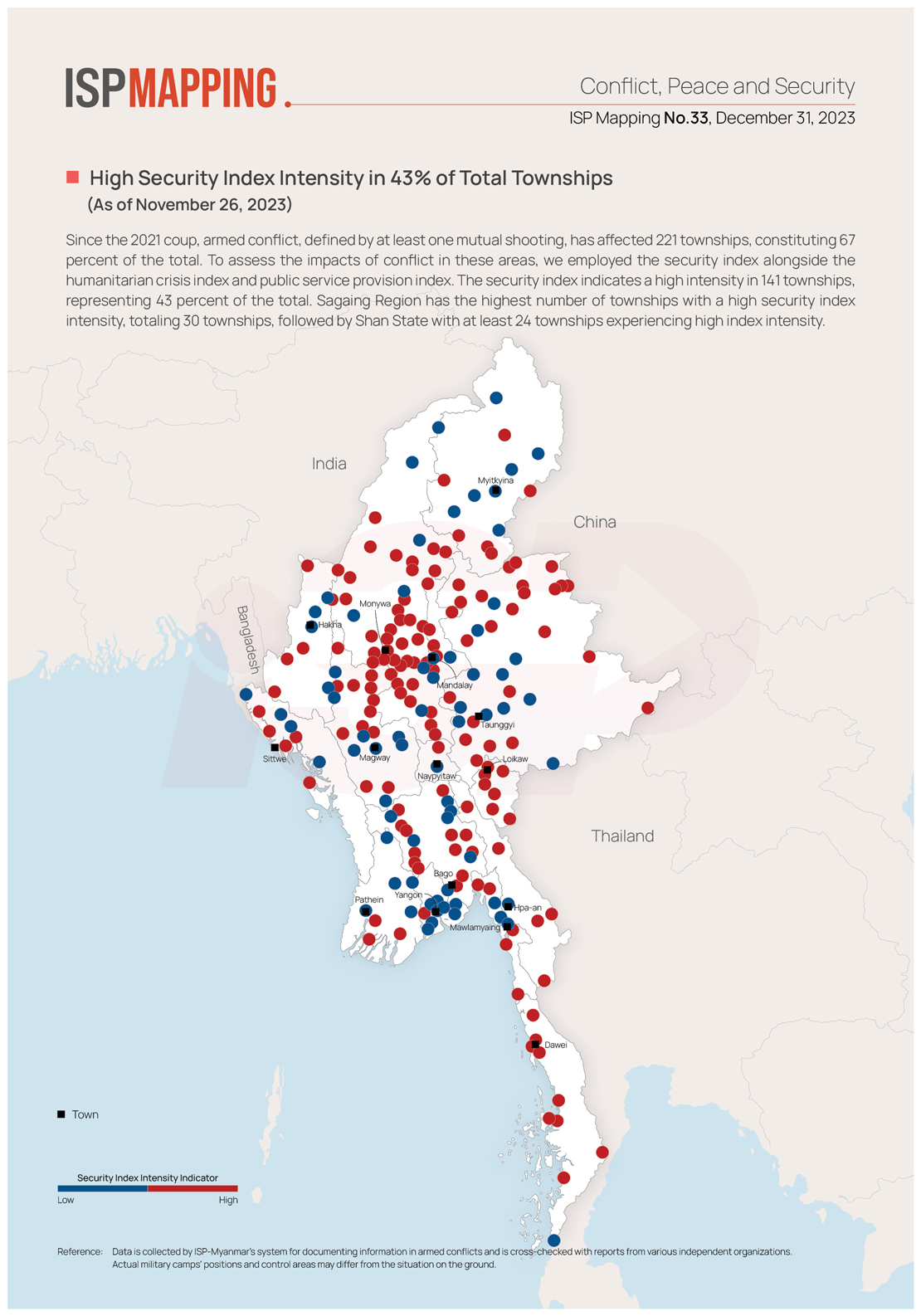

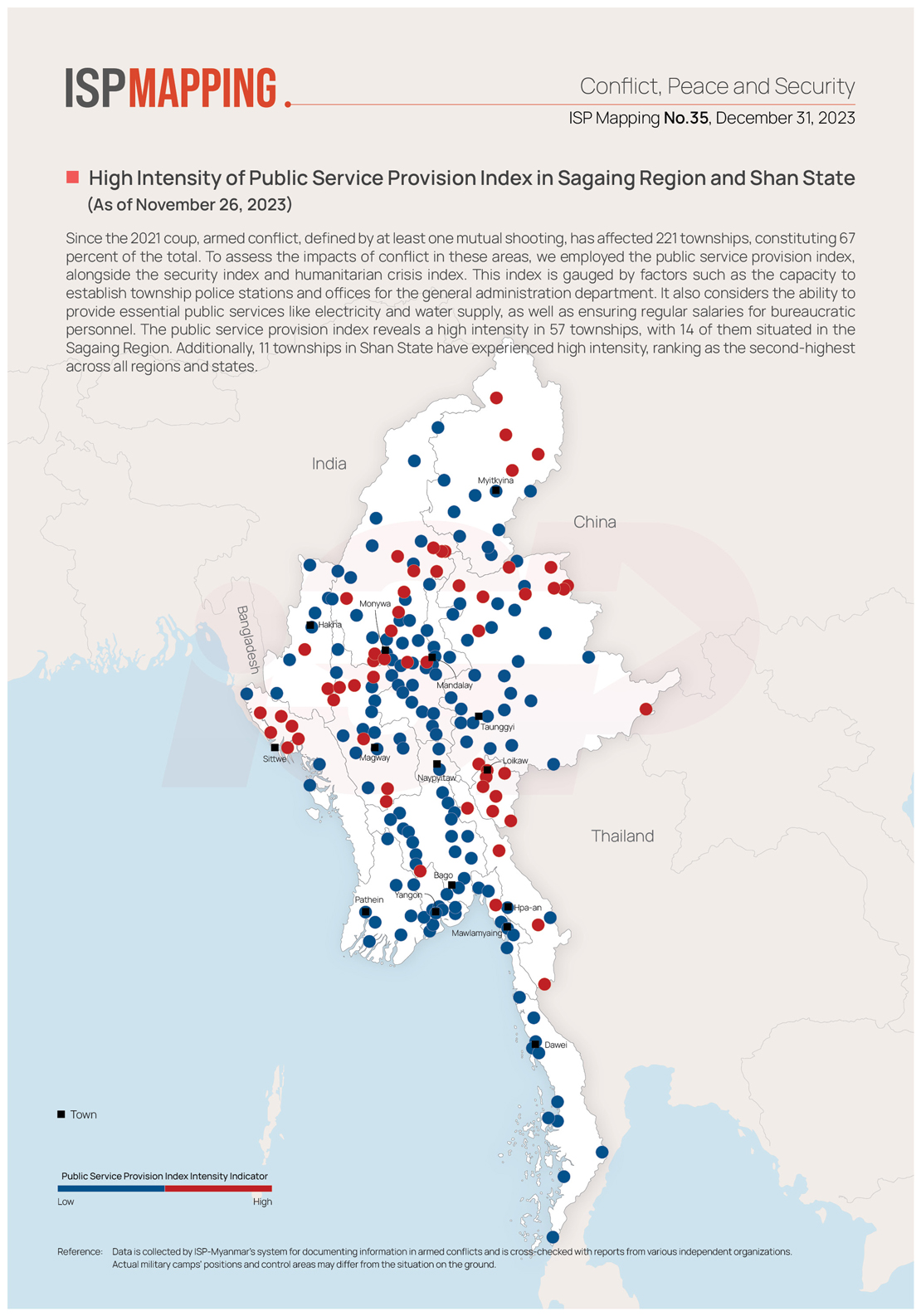
3.China’s Distinct Move
In 2023, international management of Myanmar affairs seems to dominate with the approach of “balancing geopolitical competition.” In this part, the ISP-Myanmar will focus mainly on the approaches of ASEAN and China on Myanmar affairs. ASEAN continues to hold the common position of a five-point consensus (5PC) to tackle the Myanmar crisis, but it cannot move against the Myanmar junta. ASEAN has refused to allow Myanmar’s SAC chairman to attend summit meetings, but ASEAN even cannot manage the basic work of effectively providing humanitarian assistance to Myanmar’s affected population. In ASEAN’s July 2023 summit, it was supposedly decided to overcome a deadlock situation in Myanmar, but no compromise was reached among the ASEAN leaders. The 56th ASEAN Foreign Ministerial meeting statement clearly shows that Myanmar became an obstacle to ASEAN.
ASEAN’s alternate chair in 2023, Indonesia, aspired to a unified approach and pushed for it while resolving Myanmar’s crisis. Indonesia has highlighted the problem of Myanmar as a failure of state-building and nation-building and met with almost all important stakeholders from ethnic armed organizations (EAOs) and civil society organizations (CSOs), not stopping at Naypyitaw (see ISP OnPoint No. 16). Indonesia’s approach is distinct from former ASEAN chairs, Brunei and Cambodia. It is reported that Indonesia’s special envoy held at least 180 meetings with Myanmar’s various stakeholders during Indonesia’s ASEAN chair term. Finally, Indonesia acknowledged after all these meetings, that Myanmar’s crisis will take time to resolve. On the other hand, there is disagreement among ASEAN on how to manage Myanmar’s conflict. For example, in Thailand, a neighbor of Myanmar, the approach is moving from a common aspiration of a collaborative approach among the UN, US, China, Japan, India, and ASEAN, namely the “ASEAN plus approach” towards an “ASEAN Minus”, with fewer countries being involved. The incident shows that there is a crisis in ASEAN centrality that has been revealed in dealing with Myanmar’s crisis.
While China puts ASEAN at the front to handle Myanmar’s affairs, it also encourages Thailand’s approach of “neighborhood diplomacy” (see ISP Insight email No. 17). China has encouraged either bilateral or multilateral relations and seeks solutions through informal Track 1.5 meetings. India also showed interest in a Track 1.5 meeting to seek solutions for Myanmar. India’s delegates joined in a similar meeting in March 2023 in Bangkok and organized a meeting in April in New Delhi.
Lately, China’s initiative of “neighborhood diplomacy” literally introduces a new diplomatic layer alongside the pre-existing West-led policy and ASEAN-led initiative, as Myanmar’s situation remains unresolved. The new China-led initiative can be analyzed as giving a second chance to the Myanmar military junta to find a way out of the crisis (see ISP Insight Email No. 20). China’s intention is partially believed to be a response to the US’s National Defense Authorization Act (NDAA); however, China could also be attempting to resettle the balance of power with Russia, which has been increasingly boosting its ties with Myanmar (see ISP OnPoint No. 14).
China has been promoting the participation of the isolated Myanmar regime in its initiated international forum. The approaches can be particularly seen in allowing the active participation of Myanmar junta leaders in China-led schemes of the Lancang–Mekong Cooperation (LMC), Regional Comprehensive Economic Partnership (RCEP), and the International Land-Sea Trade Corridor (ILSTC). China has transformed its previous economic corridor scheme in Myanmar, widely known as “Y-shaped logistic routes,” into a major hub in its plan to expand regional connectivity (see ISP Mapping No. 10). Meanwhile, China has practiced a “containment policy” to avoid its investments and major interests from being affected by the conflict through EAOs, which are acknowledged as being inclined to be influenced by China (see ISP Mapping No. 17). Moreover, China has managed to avoid its interests from becoming entangled in the Myanmar conflict through an effective “decoupling strategy.”
During 2023, many senior leaders of the Chinese government, including Foreign Minister Mr. Qin Gang, visited Naypyidaw frequently. During Mr. Qin Gang’s visit to Myanmar, he met with the former head of the Myanmar military, Than Shwe, and former Myanmar President, Thein Sein. During the Chinese officials’ trips, the agenda of meeting with Myanmar officials was not only about the promotion of bilateral economic cooperation and investments, but the officials also convinced Myanmar to collaborate in a crackdown on online scam (Kyar Phyant) activities in Myanmar (see ISP Explainer No.2).
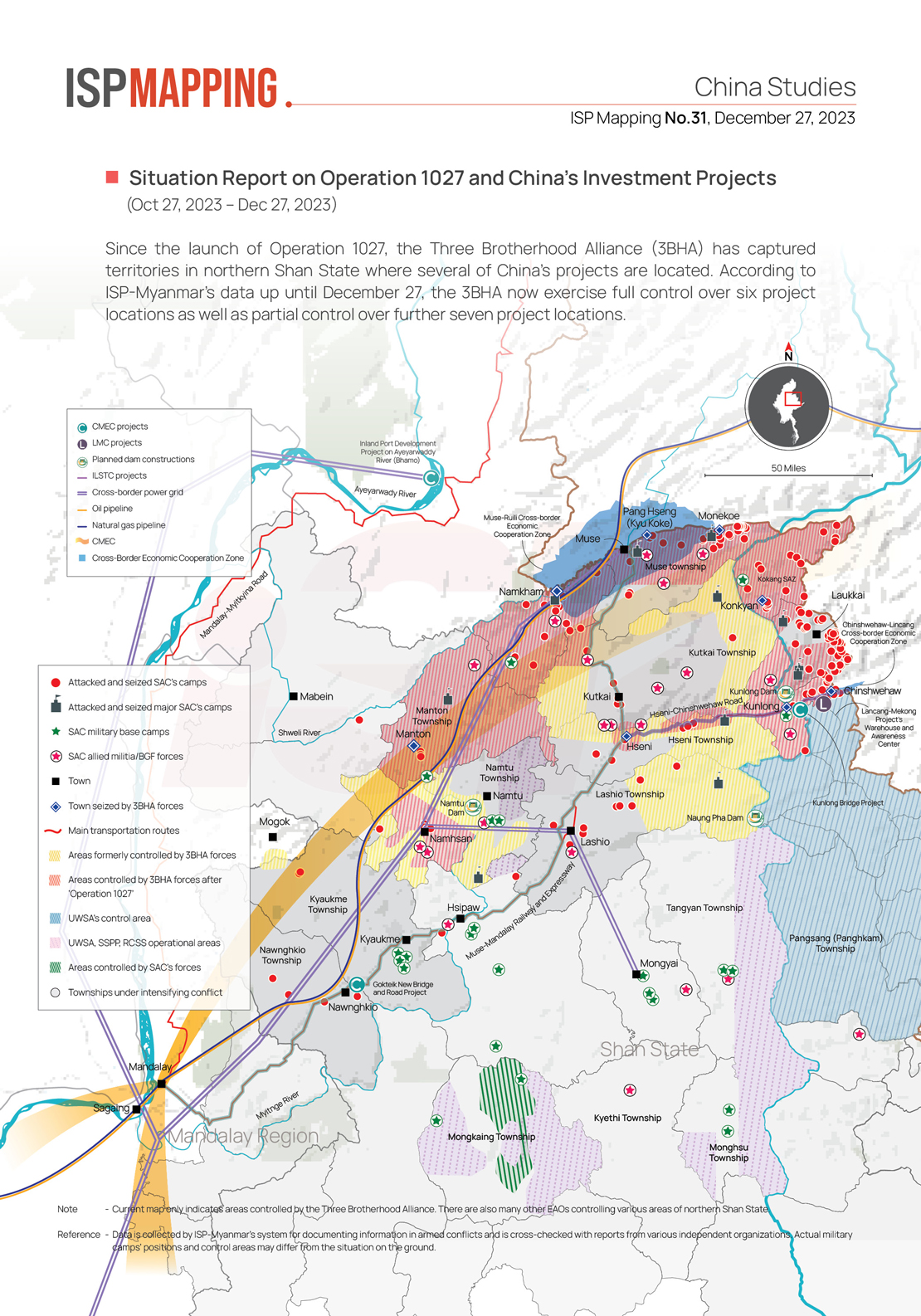
Close to the end of 2023, the Beijing government handled the arrests of criminals even on Myanmar soil, under the name of cracking down against online scammers, along with the evolving Operation 1027 offensive by Three Brotherhood Alliance (3BHA) and allied forces. As the aspirations of Operation 1027 are consistent with Chinese interests, the changes have advanced swiftly. The Chinese government desires the eradication of online scam business in the Myanmar border and a “power reconfiguration” in northern Shan State, but it does not seem to desire the impacts to reach far to the tip of the power balance and regime change in Naypyitaw (see ISP OnPoint No. 18). Therefore, when the drama of Operation 1027 escalated, China intervened in the scene. China has been mediating to meet the SAC delegates and the representatives of the 3BHA, and organized two meetings to stop the fighting (see ISP Explainer No. 9).

4.The Social Devastation
Myanmar’s economy is experiencing a sustained decline. In 2023, many economies of the world have recovered from their economic recession due to the COVID-19 pandemic, but Myanmar is an exception and can still be said to be in a state of deep recession and socio-economic deprivation. The recent World Bank report, entitled “Challenges Amid Conflict” projected that Myanmar’s economy would grow just one percent during the year before March 2024, leaving it the only economy in East Asia that has not returned to pre-pandemic levels of economic activity (see ISP Insight Email No. 29).
The World Bank report also mentioned that there is pressure against production in Myanmar due to “conflict, high logistics costs, trade and foreign exchange restrictions, and electricity disruptions.” The economic decline is more noticeable in 2023; it is visible in the long queues at gas pumps and the common people are also queuing in long lines to buy palm oil at more affordable prices. “The Bricks have Fallen,” the special report ISP-Myanmar published on February 2, 2023, explained how the value of the Myanmar Kyat depreciated between 30% and 60% during the two years since the coup. The Consumer Price Index (CPI) is swelling; in the second quarter of the 2022–23 budget year, the rate showed a 220% increase compared to the last quarter of the previous budget year. Inflation and commodity prices are higher, and people face shortages of some commodities in the market. There is a visible sign that the foreign reserves controlled by the SAC are diminishing and that the junta is struggling to earn hard currencies by various means. It seems rather than the impacts of international sanctions, SAC’s mismanagement of the economy makes the crisis worse.
ISP-Myanmar launched a socio-economic study to assess the post-coup situation of Myanmar’s society in 110 townships (out of a total of 330 townships in Myanmar) on a monthly basis. It found that the cumulation of crises was leading to famine, or thayawgyi khine in Burmese. More and more people are encountering hunger and starvation (see ISP Insight email No. 28). The townships ISP-Myanmar surveyed on a monthly basis identified the most prevalent problem as “rising commodity prices”, along with encountering an increasing burden of electricity blackout and a feeling of insecurity. In addition, Myanmar people are struggling daily with problems such as a lack of job opportunities, natural disasters, displacement by conflicts, and shortages of food, essential drugs and clean water. Moreover, the surveyed respondents answered they faced easy access to illicit drugs in their communities and that people are drowning in the vicious cycle of gambling (see ISP Insight Email No. 22 and 23).
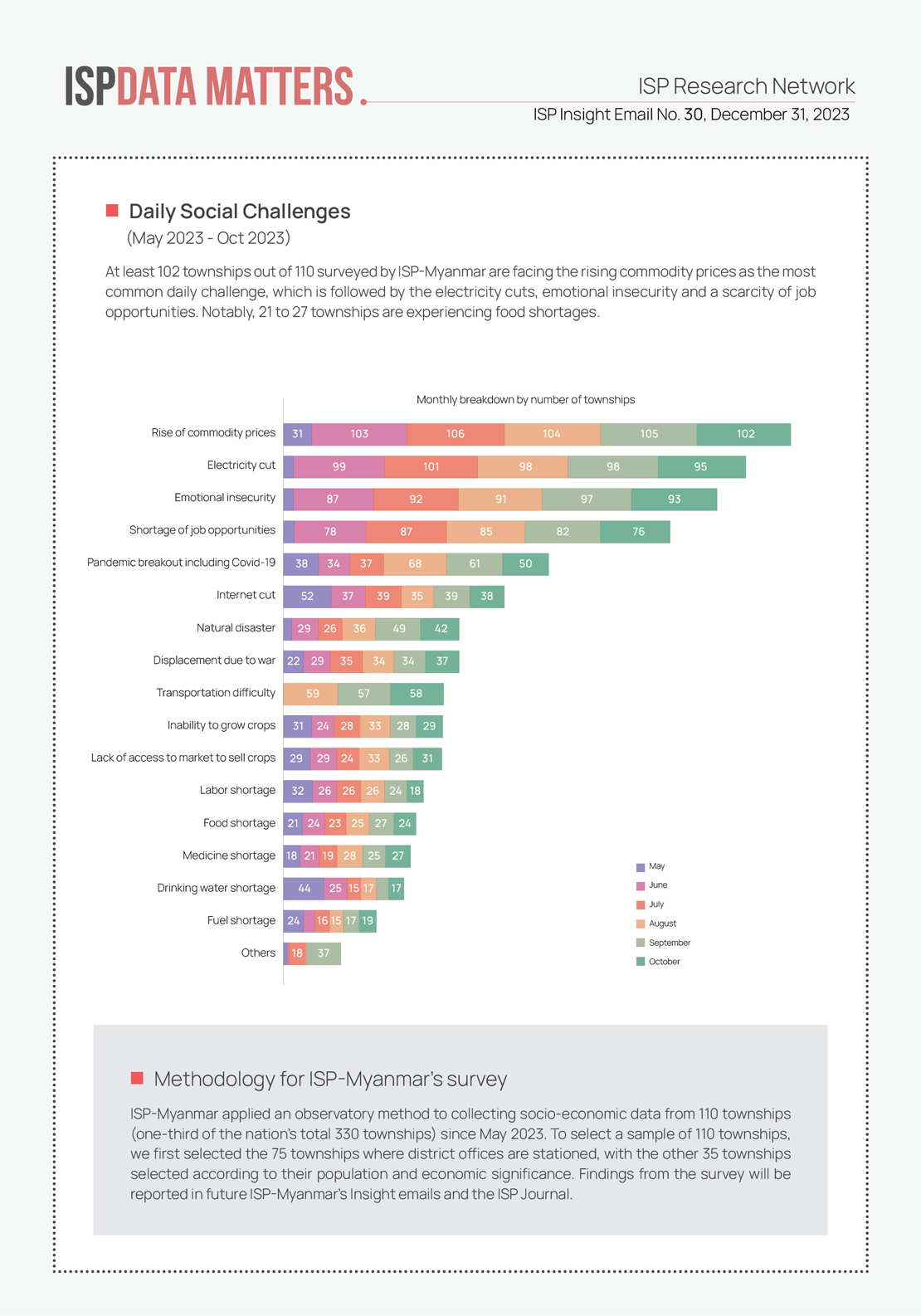
Since the conflict spread, the number of internally displaced persons (IDPs) has increased dramatically, reaching over four million in number during the three years since the military coup. Most of the IDPs are found in Sagaing Region, the second-most in Shan State, and the third-most in Rakhine State. The troubles of IDPs are insurmountable, but on the other front, the miseries of the Rohingya are continuing and will not easily cease (see ISP Insight Email No. 28). Doubling their jeopardies, Rohingya refugees sheltering in Bangladesh camps face additional restrictions and daily oppressions, and the authorities there prohibit their freedom of travel and migration. Some refugees even believe the restrictions in Bangladesh are worse than those of Myanmar (see ISP Insight Email No. 26). In order to overcome these troubles, some Rohingya decided to risk their lives in shaky small boats to reach the other shores. But many did not find their way and lost their lives. Their boats were not welcomed and sometimes driven back to the sea by the locals.
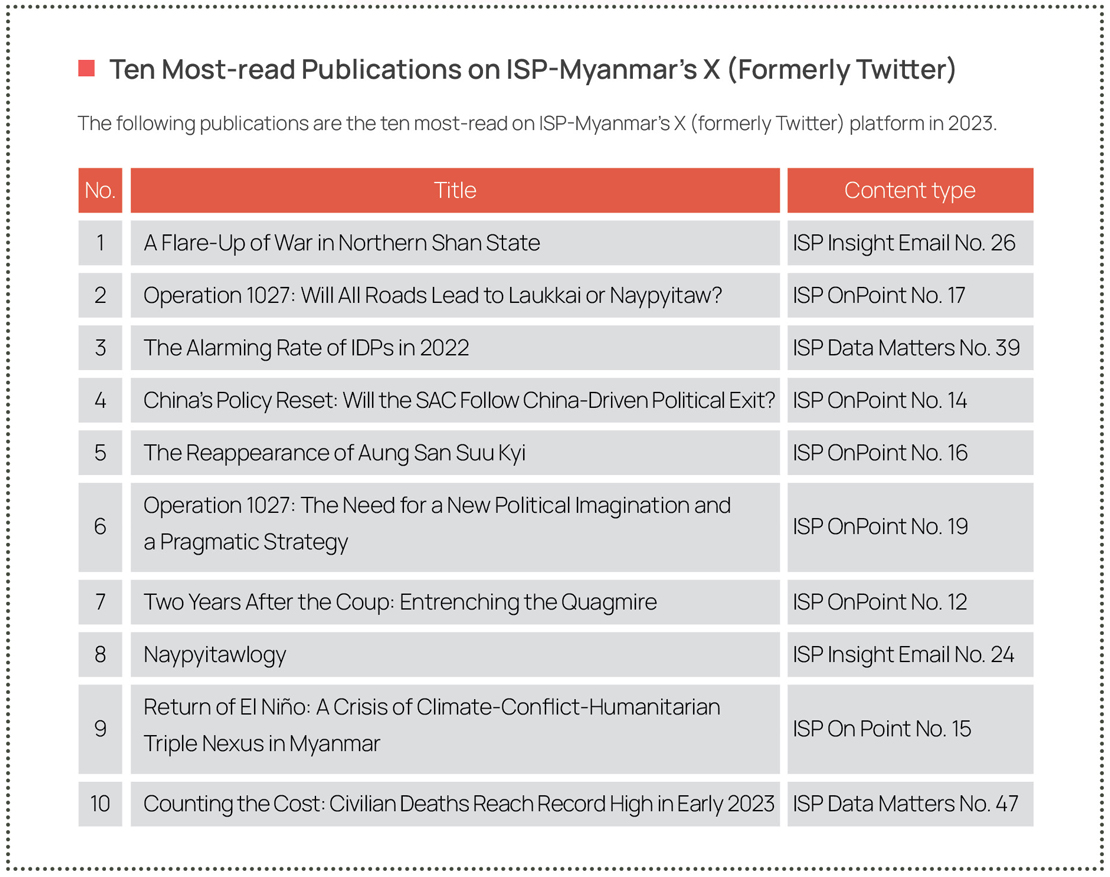
5.The Climate Impacts
International meteorologists declared that the extreme climate phenomenon El Niño arrived during 2023. Surging temperatures along with El Niño will bring extreme weather, which could threaten lives by bringing drought, damaging crops, and producing heat waves, and some parts of the world might even encounter storms, acute floods, and other damages.
Myanmar was identified as the second-most vulnerable country to climate change in the world. At the same time as the El Niño phenomenon was emerging, a destructive storm, Cyclone Mocha, made landfall near Sittwe of Rakhine in May 2023 and wreaked havoc on the nearly 5.4 million inhabitants and the population of other states and regions in its path, causing widespread destruction. Cyclone Mocha was the second-most severely damaging cyclone to hit Myanmar after Cyclone Nargis in 2008 (see ISP OnPoint No. 15). But unlike with Cyclone Nargis, this time, the authorities, including the SAC and Arkan Army (AA), were able to give early warning and reduce the deaths.
According to SAC counts, 145 people were killed by the cyclone. International media reported that around 400 Rohingya refugees were killed by the cyclone, but the SAC rejected this and stated on May 18, 2023, that only 91 Rohingya were killed. Neighbors and international agencies offered emergency assistance to cyclone victims, but the junta halted the free flow of aid to the affected areas and distributed it by their own hands. Many local volunteers’ aids were prohibited at the inspection checkpoints (see ISP Insight Email No. 19). The SAC claimed that almost 90 percent of rehabilitation works are complete in Rakhine State, but this claim has met with suspicion, and the resumption of fighting makes it hard to believe.
The second natural disaster was acute flooding, which hit many areas of Myanmar, including Bago, in October 2023. In Bago City, the water level reached 940 cm on October 9, above the “danger level” of 880 cm. In three days of flooding, fifteen wards and nine villages (80 percent of the city) were inundated, amounting to the worst flooding in 60 years, affecting over 13,000 people. News organizations reported that in addition to Bago City, Hmawbi, Taik-Kyi, Kyaik Hto townships and some places on the Yangon–Mandalay highway were flooded. These are also a warning about the impacts of climate change on Myanmar. As ISP-Myanmar discussed in May 2023 in ISP OnPoint No. 15, “Myanmar is already vulnerable to severe weather effects caused by El Niño. Now the country faces a potential “double jeopardy” with regard to future natural disasters, as it continues to struggle with ongoing internal political strife. Society could face a downward spiral into an even more desperate humanitarian disaster. In recent years, Myanmar has suffered almost simultaneously from the COVID-19 pandemic and a military coup. The strain from additional protracted catastrophes could outstrip Myanmar’s ability to help itself and leave the country vulnerable to becoming a failed state (see ISP Insight Email No.24).

The above-mentioned five topics are summarized in brief from 238 publications and ISP-Myanmar made in 2023. As mentioned earlier in the Editor’s Foreword, we are just looking back at what had happened in the last year and the brief discussion may not cover all events comprehensively. But there are some notable issues and events that we should not leave behind.
One of the events that happened in 2023 is that the SAC built the world’s largest stupa in Naypyitaw, the Maravijaya Buddha Stupa, which is set to become the world’s highest marble stone image, adding to its significance. The stupa may serve as a poignant expression of the SAC’s quest for power and prestige, but it is interesting the way that the junta superstitiously managed the weight and height of the stupa and the height of the base throne, the timing of the consecration and the numbers of monks invited to the donation ceremony – all of the related numbers add up to the sacred number “9” (see ISP Insight Email No.19).
In a great loss for the country’s sphere of sasana (religion), the reverend chairman abbot of the State Sangha Council, the ninth Bhamo Sayadaw Dr. Bhaddanta Kumara Bhivamsa, peacefully passed away on 25 May 2023, at 94 years of age. He had served as pro-rector at the International Theravada Buddhist Missionary University and wrote many tracts of religious literature. His demise is a great loss for Buddhist communities in Myanmar.
Another reverend monk, Sishin Sayardaw Bhaddanta Agga Nyarnar Bhivamsa, the associate authority of the Shwegyin Buddhist congregation, the second largest monastic order of monks in Myanmar, passed away on November 19, 2023. Traditionally, Shwegyin Nikaya (congregation) is a more orthodox order, staying away from politics, and many people show respect to the monks, since the congregation’s strict adherence to the Vinaya, the texts of the Buddhist canon prescribed the rules and precepts for Buddhist Sanghas. His demise is also a great loss as well.
In 2023, the famous author, Nyi Pu Lay passed away, and Mahadevi Sao Thusandi and artist Sit Nyein Aye passed away in foreign countries. Author Seint (education), former minister Nai Thet Lwin, popular film star Thiha Tin Soe, and singer Twante Soe Aung sadly departed. What’s more, the famous traditional boxer Tu Tu was killed during an investigation by Myanmar authorities, and many unknown youths died by various means during the intensifying conflict in the nation.
Among these sorrowful events was one chapter which could be entitled “Beauty and the War”: many Myanmar citizens voted actively in support of Miss Ni Ni Lin Eain of Mon nationality for the Miss Grand International 2023 Pageant. Miss Ni reportedly earned 2.3 million votes on Instagram, which earned the Country’s Power award. These votes were not for free: supporters bought credit to support her, with each unit equivalent to one USD. Many netizens have criticized people senselessly voting for a beauty queen on social media during a time of conflict, poverty, and scarcity in the country. Myanmar, a country plagued by civil strife and underdevelopment, has a population that seems ravenous for shared and collective pride, and this could be noticeably a good explanation for the voting (see ISP Insight Email No.26).
Another interesting boom in popularity was seen in the song by “Anonimus”, a youth singer who posted his song namely, “Htar Like Par!” in Burmese (meaning “Leave it Alone!”), on YouTube. Within four months, the song received over 25 million views. This song is at the top of the hit list and can be heard everywhere, sung by kids and heard on radios in every corner of Myanmar.
To receive ISP Insight Emails in your inbox, subscribe at this link.

